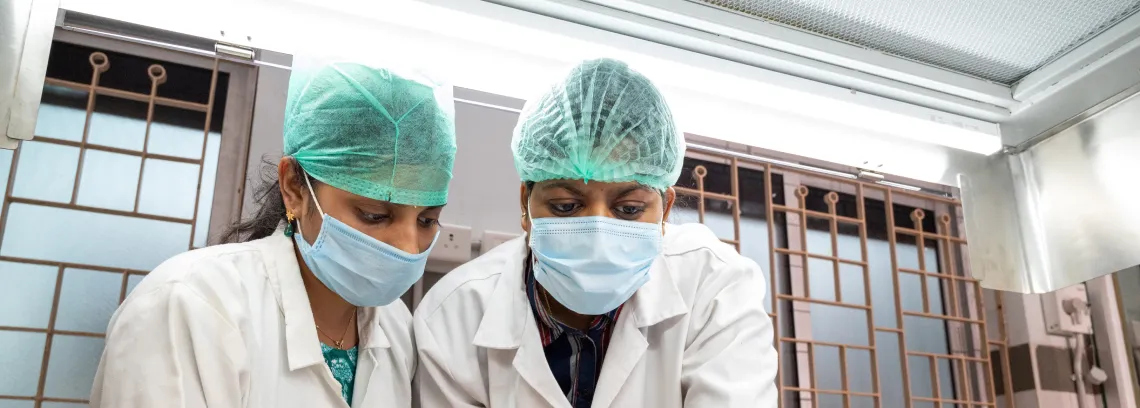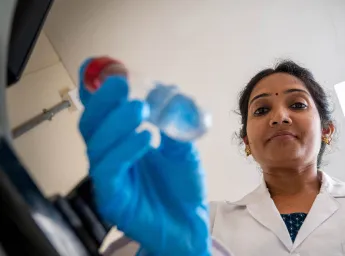Investigator Guidelines
Eligibility
- Investigators must have a postgraduate or Ph.D. qualification with prior experience in handling experimental animals or relevant certification.
- Knowledge of CPCSEA guidelines is required.
Financial Commitment
- Researcher using experimental animal (s) shall be responsible for the welfare of animal(s) during their use in experiments as per the Institutional Animal Ethics Committee (IAEC) approved experimental protocol.
- Investigator shall not acquire any animal by sale or otherwise except from a registered breeder or establishment which is approved CPCSEA.
- No animal shall be imported, researcher except genetically defined or laboratory bred experimental rats and mice of genetically defined strains, which is available in the country.
- Feed, bedding, sanitization, and sterilization per diem cost should be paid by the investigator. # Per diem cost may be changed based on the availability and price of the materials. Please contact Scientist in-Charge, Animal house at iaec_gitam@gitam.edu for getting the estimated cost.
- Instructions should be given by the principal investigator in writing to the animal house- in- charge w.r.t. providing water and food to the animals or withdraw of water or feed for specific time and duration, if any.
- Investigator should provide any special diet to be given to their experimental animals.
- Investigators shall be responsible for the aftercare and rehabilitation of animal(s) after experimentation, and shall not euthanize animal(s) except in situations as defined below: (a) When the animal is paralyzed and is not able to perform its natural functions or it becomes incapable of independent locomotion, or it can no longer perceive the environment in an intelligible manner; or (b) During the course of experimental procedure, the animal has been left with a recurring pain wherein the animal exhibits obvious signs of pain and suffering; or (c) Where the non-termination of the life of the experimental animal will be life threatening to human beings or other animals.
- Costs of aftercare and rehabilitation of animal(s) after experimentation shall be made part of research costs and shall be scaled in positive correlation with the level of costs involved in such aftercare and rehabilitation of the animal(s); (Note: Rehabilitation of small animals (Rodents) is not necessary. All the rodents should humanely euthanize after the experiment).
- Rehabilitation treatment of an animal after experimentation shall extend till the point the animal is able to resume a normal existence by providing a lump-sum amount as costs for rehabilitation and care of such animal to cover its entire statistical expected lifespan; and
- The establishment undertaking experiments or duly licensed and authorized animal welfare organization under the control of the Committee may, on payment of the lump-sum amount, undertake rehabilitation of animals.
Application Procedures
- Experimental proposals to be followed should be submitted by the investigator in the prescribed application form (Form B), The application should be submitted on or before 30 days prior to the meeting schedule.
- Meetings of IAEC will be convened once in every 3 months subjected to the availability of minimum three applications. Additional meetings can be convened as and when necessary. Meetings are convened in 3rd or 4th week of March, June, September, and December. (Date will be decided at the end of previous meeting).
- Proposal should be submitted on or before 15thof February, May, August, and November for upcoming IAEC meeting in the month of March, June, September, and December.
- All relevant documents as per checklist should be enclosed with application form.
- The required number of copies of the proposal along with the application and documents in prescribed format duly signed by the Principal Investigator (PI) and Co- investigators/Collaborators and forwarded by the HOD/HOI.
- The Member Secretary will acknowledge the receipt and indicate if any lacunae. Missing information if any can be submitted by PI within TWO weeks.
- The date of meeting will be communicated to the PI, who should be available on the day of meeting and have to deliver a presentation to the IAEC.
Minutes of the meeting
- The minutes of the meeting of IAEC will be communicated to the PI by the Member Secretary in writing. If revision is necessary, the revised document in the required number of copies to be submitted within a stipulated period as specified in the communication.
- Suggestions for modifications and reasons for rejection will be communicated to the PI.
Follow up procedures
- The species and No. of animals as approved need to be procured by the PI from a CPCSEA registered breeder in accordance to rule ten of the breeding and experiments on animals’ control and supervision, rules1998, as amended.
- Record of Animals acquired and experiments performed should be maintained (Annexure- II).
- Reports should be submitted by PI at prescribed intervals for the review, and it should not exceed the timeline of the research as mentioned in the Form B.
- The final report should be submitted by PI.
- All Serious Adverse Events (SAEs) and the interventions undertaken should be intimated to IAEC.
- During the experimentation, if any Protocol deviations are adopted should be communicated by the PI with adequate justification to IAEC.
- Any amendment(S) to the protocol should be resubmitted to IAEC for renewed approval.
- Any additional information obtained related to the study will be communicated to IAEC by PI.
- Premature termination of the study by the PI will be communicated with reasons along with the summary of data obtained so far.
- Change of investigators /sites should be communicated of IAEC should be taken.
- You must quote the proposal number in your future correspondence.
- Abide by the conditions stipulated in the investigators' declaration as submitted by you to IAEC.
- Any other regulations/stipulations as may be notified from time to time by CPCSEA shall also be applicable.
- Follow the guidelines furnished in the CPCSEA standard operating procedures for the Institutional animal ethics committee, as framed from time to time.
- Documents /registers as may be applicable need to be maintained by the investigator properly.
- In the case of the funded project, the principal investigator also needs to abide by the funding agency's guidelines.
Performance of experiments
In conducting experiments on animals, regard shall be had to the following conditions, namely:
- Experiments shall be performed in every case by or under the supervision of a person duly qualified in that behalf, that is, Degree or Diploma holders in Veterinary Science or Medicine or Laboratory Animal Science of a University or an Institution recognised by the Government for the purpose and under the responsibility of the person performing the experiment.
- Experiments shall be performed with due care and humanity.
- Animals intended for the performance of experiments are properly looked both before and after experiments.
- Experiments involving operative procedure more severe than simple inoculation or superficial venesection shall be performed under the influence of anaesthetic to prevent the pain and it shall remain so throughout the experiment.
- Anaesthesia shall be administered by a Veterinary Surgeon trained in methods of anaesthesia or a Scientist/technician so trained for this purpose and who shall remain present near the animal till the completion of the experiment.
- Animals which in the course of experiments under the influence of anaesthetic are so injured that their recovery would involve pain or suffering shall be sacrificed humanely while still under the influence of anaesthesia.
- When there is reason to believe that an animal is suffering abnormal or severe pain at any stage of a continuing experiment, it shall be painlessly destroyed at that stage without proceeding with the experiment.
- The experiment shall not be performed for the purpose of attaining or retaining manual skills except in schools, colleges and recognized training institutions duly scrutinized and permitted in registered establishments by the Committee.
- Experiments shall not be performed by way of an illustration.
- Experiments shall not be performed as a public demonstration.
- The substance known as Urari or Curari or any such paralysing shall not be used or administered for the purpose of any experiment except in conjunction with anaesthetic of sufficient depth to produce loss of consciousness.
- No experiment the result of which is already conclusively known shall be repeated without justification.
- There shall not be applied to the eye of an animal by way of experiment any chemical substance for the purpose of absorption through the conjunctival membrane or through the cornea calculated to only give pain.
- Where experiments are performed in any institution, the responsibility, therefore, is placed on the person in charge of the institution, and in cases where experiments are performed outside an institution by an individual qualified on that behalf, the experiments, are performed on his responsibility.
- Post experimentation, all the bio-wastes (animal carcass, tissues, and contaminated disposables) should be disposed of as per the policy of the University Biosafety committee.







